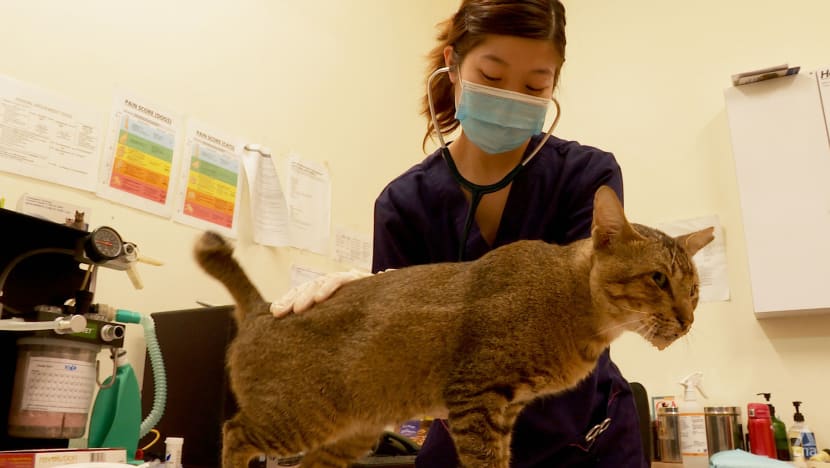Commentary: Having a pet is not all sunshine and rainbows, it’s hard work
Recent stories of pets being sold or abandoned for behavioural reasons are puzzling to anyone who understands animal behaviour, says SPCA’s Jaipal Singh Gill.

SINGAPORE: You don’t need to have a pet to know that chewing, barking or meowing, jumping and digging, pooing and peeing are all perfectly natural animal behaviours.
So anyone with a basic understanding of cat and dog behaviour would be puzzled at two stories last month: A woman was fined for abandoning two adopted kittens, while a man sold a Jack Russell terrier he had adopted and was later fined for keeping it for sale without a licence.
The animals were ditched very soon after they were obtained. The purported reason? Their behaviour – the kittens were “hyperactive” and made noises that “stressed out” the woman, while the dog had scratched the man’s sofa and barked non-stop.
Why should anyone be surprised kittens are active and love to play or that dogs chew items around the house?
Yet every day, the Society for the Prevention of Cruelty to Animals (SPCA) Singapore receives requests to take in pets who are no longer wanted.
DOGS THAT DON’T BARK, SHED OR BITE?
Believe it or not, potential adopters have asked us for a fully-trained dog that doesn’t bark, shed fur or bite.
Short of getting a virtual pet, there appears to be a huge mismatch between the expectations and realities of keeping one in the flesh.
But why should we blame the animals when we humans have taken them into an artificial environment and speak to them in a language they cannot understand?
Let’s not forget the many stressors we impose on them, from noisy appliances and confined spaces to strange arbitrary rules against their natural instinct: Why is chewing a toy allowed but not a shoe? Why toilet only in one area of the house or when the human has time for a walk? Why can it only make “noise” at certain times?

A big part of the problem is a lack of understanding and knowledge about the animal’s biology, perhaps reinforced by social media. It’s common to see many more cute pet videos, pictures and memes than depictions of harsher realities.
Some may be misled to believe keeping a pet is all sunshine and rainbows and obtain one without learning sufficiently about pet care, health and behaviour. We’ve seen neglected rabbits mistakenly fed a diet of mainly carrots instead of hay, grass and leafy greens, leading to digestive problems and malnutrition.
Some people forget our responsibility of training animals in a way they understand and tending to their health. Others start off trying their best, but lose patience when training takes longer than expected.
There are no quick fixes. Each animal learns and develops at a different pace - one dog may toilet train within days, another might take weeks.
REALITY OF KEEPING PETS NOT ALWAYS FUN
A pet relies fully on us for almost everything and are at our mercy. This is a heavy responsibility that should never be taken lightly or underestimated.
Some get certain dog breeds without realising they were historically bred as high-energy working dogs and need a lot of exercise. You’re going to have to walk a sheepdog much longer and farther than a pug.
You can expect a host of behavioural problems if there is no suitable outlet for the animal to expend physical and mental energy.
If a “problem” behaviour like excessive barking develops, the amount of time and energy required increases significantly. Months of hard work may help resolve it, sometimes it must be managed for life.
Some may try to short-cut the process, perhaps by beating the animal every time it barked. But this doesn’t teach the animal what it’s expected to do and can lead to side effects like aggressive behaviour.
Financial cost, specifically medical costs, is the largest and often overlooked expense in our experience.
Sudden and large vet bills have been known to shock many after an unexpected illness or accident - surgery to repair a broken leg can cost between S$3,000 to S$5,000 - and few people consider pet insurance.
Just like humans, animals’ needs change over time. Regular check-ups add up, including procedures we don’t consider at the outset. For example, dental disease is a common problem for dogs and cats, and regular dental scaling can cost about S$300 on average.
Ageing pets often require more care, such as frequent trips to the vet or care facilities for regular medication, injections and physiotherapy, if a chronic medical condition develops. Many dogs develop chronic skin or eye problems and it is not uncommon for cats to have kidney disease.

And then there is the emotional toll of caring for a sick or ageing pet, when they no longer have the energy or ability to interact with us and provide the level of companionship we’re used to.
THINGS CAN GO TERRIBLY WRONG
It’s almost always the animal that suffers because of this mismatch of expectations and realities of us humans.
Many approach SPCA to take in pets they no longer want. Such separation can cause emotional distress to an animal.
Abandonment, where animals are released and left to fend for themselves, occurs more often than we might imagine. Some die or may suffer before being rescued by kind folks.
It’s sad to think that relinquishing a pet might not even be the worst outcome.
People who are unable or unwilling to adequately care for animals often end up neglecting them - locking them up in a cage rather than putting in the time and effort to address the animal’s needs. We sometimes see pets with severe behavioural challenges, possibly caused by abuse or a failure to provide for them.
And then there is outright cruelty and abuse, usually when someone is too frustrated with something the animal is doing.
The SPCA recently received a disturbing case of a woman repeatedly and cruelly beating her Pomeranian. The dog appeared to have done something “wrong”, possibly toileting where it shouldn’t have, and she was bent on “teaching” it a lesson. The authorities are currently investigating.
PETS AREN’T FOR EVERYONE
Of course, there are many incredible people who provide loving homes for their pets. But the realities of having a pet need to be spoken about so that we discourage those not ready to face them.
Animals have complex physical and psychological needs. We humans must fully commit to the tremendous responsibility when we decide to bring a pet into our care - one that must last for the animal’s lifetime.
We must start to share not only the ups but also the downs of our lives with pets. It would also help to have a community to support people facing specific problems as we can learn from someone who has gone through a similar situation.
Our companion animals give us so much of unconditional love. It is only right we do our very best for them in return.
Dr Jaipal Singh Gill is Executive Director of SPCA in Singapore.

















